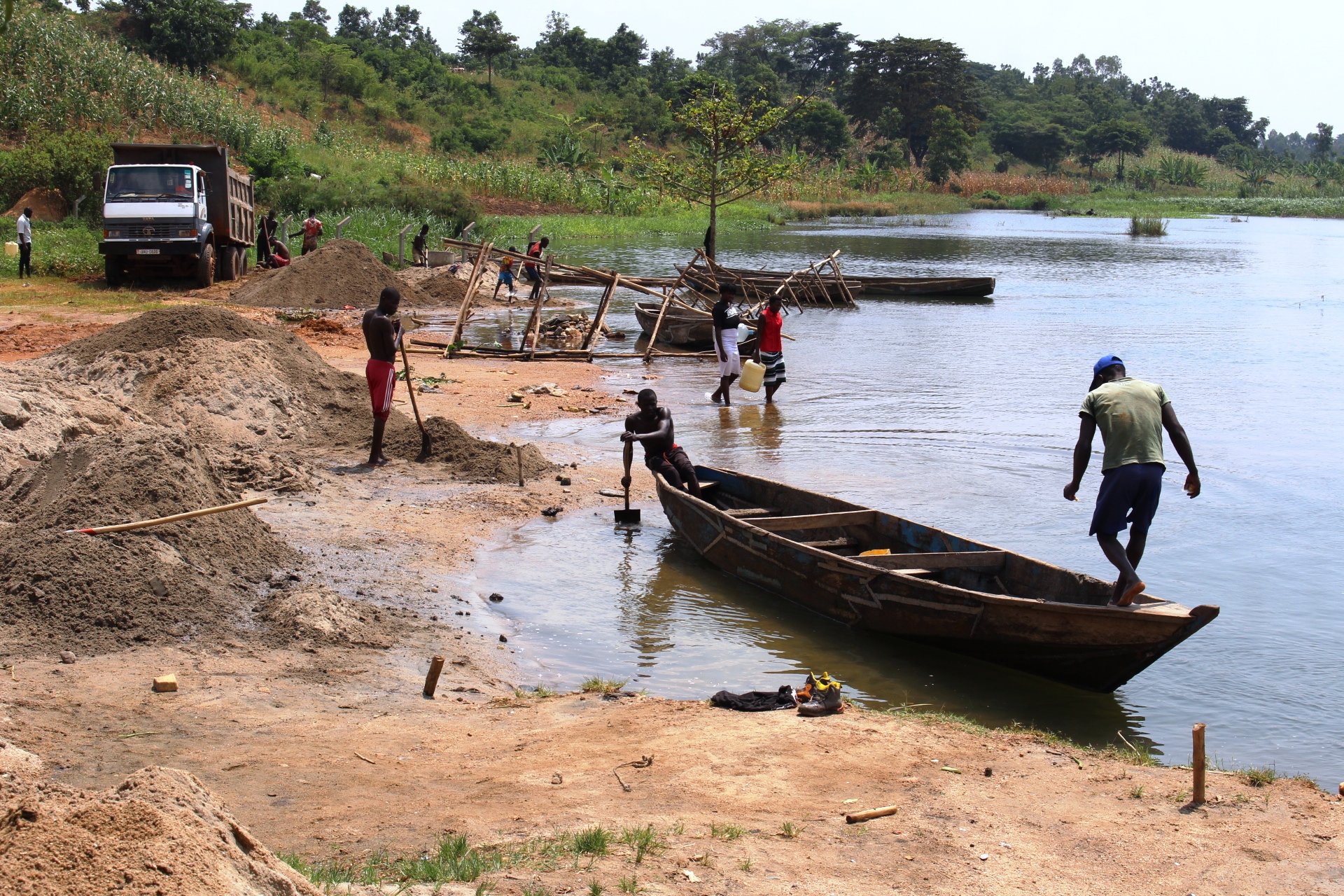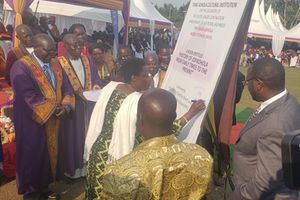
Single mothers through the Northern Division Constituency Produce Dealers Sacco in Mbale City embarked on the baking business after accessing Emyoga funds. PHOTOs | HERBERT KAMOGA
The government’s anti-poverty programme dubbed Emyooga, has gained significant traction in the Elgon region, with several beneficiaries sharing success stories.
Mr Simon Peter Egirait, the Mbale zonal manager, says: “The government through the Microfinance Support Centre, the implementing agency has disbursed a total of 26.5 billion to 777 Saccos benefitting 6.961 associations across the three sub-regions of Bugisu, Bukedi, and Sebei in the last five years.”
One of the most inspiring stories is that of Ms Joy Chebet, a single mother from Kapchorwa District, Sebei Sub-region, who has thrived as an entrepreneur through the Kapchorwa Municipality Women Entrepreneurs Emyooga Sacco.
After receiving a Shs1.5 million loan, she invested in essential coffee processing equipment, boosting her production and earning at least Shs50,000 from sales daily. Selling coffee to tourists at Sipi Falls has allowed her to fund her children’s university education, purchase land, and secure her family’s future.
“I paid for my children’s university education entirely from my coffee sales,” Ms Chebet shares.
Ms Claudia Chekwoti, the chairperson of Kapchorwa Women Entrepreneurs Sacco, says: “The Emyooga programme has greatly fostered a saving culture among our members.”
“Previously, our 224 members faced a bleak financial situation, with banks requiring collateral [security] which we lacked. We were often forced to turn to expensive money lenders. Now, we can access loans with low interest rates,” she adds.
Similarly, Ms Jocelyn Chepkurui’s life changed through her involvement with the Kapchorwa Municipality Tailors Emyooga Sacco.
“I was only limited to household duties and financial dependency due to early marriage and dropping out of school, I enrolled in the Sacco’s skilling programme at Mt Olive Training Centre [in Kapchorwa Municipality], dedicating a year to tailoring training,” she says.
Lacking capital, she saved enough to secure a Shs5 million loan from the Sacco.
“I used the money to buy four sewing machines at Shs3 million and used the balance to buy the necessary materials, and cover rent,” she explains.
Her business thrived, enabling her to repay the loan and become one of Kapchorwa’s top tailors, earning at least Shs80,000 daily.
Youth employment
Namaubi Plastics, located in Namaubi B Village, Dabani Sub-county in Busia District, tackles environmental issues while providing respectable livelihoods to local youth, including school dropouts and street children.
Founded in 2018 by six school dropouts, the venture began by collecting and selling discarded plastics. “We pooled Shs2 million each over six months to raise Shs12 million, which funded our initial efforts,” says the founding member, Mr James Lubega Baseka.
The Emyooga initiative marked a turning point by awarding them Shs30 million in seed capital through the Samia Bugwe North Youth Leaders Emyooga Sacco.
“We first extended loans to strengthen or start new ventures,” explains Sacco chairperson Isaac Wafula. The funds were reinvested into purchasing a Shs12 million crushing machine.
“We realised that adding value to plastics would yield higher returns, so we used Shs10 million from Emyooga to buy a crusher on an installment plan,” Mr Wafula adds.
Subsequently, they acquired a washing machine and a dryer at Shs8 million and Shs14 million, respectively, funded by earnings and an additional Shs20 million in government seed capital.
“With these investments, we established a mini-factory for sorting, crushing, washing, drying, and packing plastics,” says Mr Wafula.

Lillian Kayeji, a school dropout, now earns a living from tailoring skills obtained from Mt Olive Training Centre in Kapchorwa District.
The facility processes about 13 tonnes of plastics weekly, earning roughly Shs2.7 million per tonne.
“This venture has greatly enhanced social welfare, employing 35 people who each earn at least Shs20,000 daily, and benefiting many others, including street children who collect plastics for us,” he reveals.
The Sacco plans to expand by recycling plastics into items such chairs and basins, which requires substantial investment in molding and recycling equipment.
“We have proposed an additional Shs300 million to the government for this expansion, which will create more than 200 direct jobs,” Mr Wafula says.
Shoemaking
In Budibya Village, Masinya Sub-county, the Bumunji Shoe-makers Youth Group is revolutionising local shoe-making. Specialising in school and office footwear, the group increased production from 10 to more than 50 pairs daily after securing a Shs10 million loan from Emyooga.
Founded in November 2022, Mr Thomas Ouma and Mr Achules Bwire inspired five others to form the group, starting with collective savings of Shs2 million to buy essential equipment.
“This initial fund helped us purchase a sewing machine and materials to begin our operations,” says Mr Ouma.
Their commitment is evident as they’ve trained more than 20 school dropouts, offering them vocational skills and stable income.
Mr Isaac Ogutu Osinya, a former casual labourer, now earns at least Shs7,000 daily from shoemaking, compared to just Shs5,000 from digging.
“I transitioned from digging to a stable income venture through the group,” Mr Ogutu shares.
The group aims to expand into a full-fledged factory within five years and seeks government support to overcome obstacles and enhance their community impact.
In Bukwo District, local journalists have ventured into transport through the Emyooga Programme.
Mr Ismael Cheptoyek, the chairperson of the T’oo Journalists’ Emyooga Sacco, describes their journey.
“After receiving Shs30 million from the government, we initially distributed loans but saw minimal returns. This prompted a strategic shift,” he says.
Recognising a gap in local transport with outdated taxis, the journalists pooled an additional Shs10 million, totaling Shs40 million to buy a new Shs80 million taxi, and paying the balance in installments.
“The new taxi service offers a safer, more comfortable alternative to old cabs,” Mr Cheptoyek says. The service quickly became popular, with the taxi earning up to Shs600,000 on busy days and around Shs100,000 on slower days.
“Even with variable passenger demand, the venture provides substantial financial benefits,” says Mr Juma Chemonges, the driver, who, along with conductor Caleb Kiplangat, ensures a safe and pleasant ride.
Hope and resilience
When Ms Justine Kabuni Bisikwa and Ms Gloria Nadunga became pregnant at 16 and 19, respectively, their lives took unexpected turns, abruptly ending their educational pursuits.
At 20, Ms Kabuni recalls her desperate situation: “My mother was bedridden, and we struggled financially. A man offered me financial help, and to afford her medical care, I accepted his advances. The first time we were intimate, I became pregnant. I later discovered he was married, and he abandoned me, denying responsibility.” Alone and unsupported, Ms Kabuni struggled to make ends meet, watching her dreams fade.
Similarly, Ms Nadungu’s life unraveled in 2020 when she discovered she was pregnant during her first year at Bugema University, where she was studying Education.
“My parents, especially my dad, were deeply disappointed and disowned me, leaving me to fend for myself and my unborn child,” Ms Nadungu shares, her voice trembling.
Both women faced the harsh realities of single motherhood, marked by isolation, hardship, and societal judgment. Their circumstances seemed overwhelming, and hope felt distant.
However, a local initiative by the Northern Division Constituency Produce Dealers Sacco began to change their lives. The Sacco, focused on supporting distressed single mothers, reached out and offered a lifeline.
“I was initially reluctant, but after a few meetings, I realised I had found others with similar struggles. I felt supported,” Ms Kabuni recalls.
The Sacco introduced Kabuni, Nadungu, and more than 60 other young mothers to skill-building programmes in baking, snack-making, and small business management. Kabuni’s passion for baking led her to create popular artisanal bread and cakes. Nadungu found comfort in making snacks and packing ground nuts. The support network among single mothers transformed their stories from despair to success.
In Bukwo District, a 17-year-old Lillian Kayeji was forced to drop out of school to care for her family after her father’s death. Her mother couldn’t afford her school fees. “After P7, I joined Amanang SS for Senior One, but I only attended the first term. I was frequently sent home for fees,” Kayeji recalls.
Ms Grace Achemi, the chairperson of the Kapchorwa Municipality Tailors Emyooga Sacco, encountered Kayeji during a gospel mission and was moved by her plight.
“I was touched by her story. I offered her a home and an opportunity to learn tailoring at Mt Olive Training Centre,” Ms Achemi says.
“The training not only gave me skills but also renewed my hope. I now aspire to be a fashionista and run my own business,” Kayeji reveals.
However, challenges continue to impede the smooth operation of the Emyooga initiative. “Loan recovery remains the biggest hurdle for many Saccos,” explains Ms Achemi.
About emyooga
Launched in August 2019, the Emyooga initiative is part of a broader strategy to shift 39 percent of households from subsistence to market-oriented production. The programme supports specialised savings and credit cooperative societies (Saccos) for various groups such as boda boda riders, women entrepreneurs, carpenters, and tailors, aiming to foster wealth, and job creation at the grassroots level.








